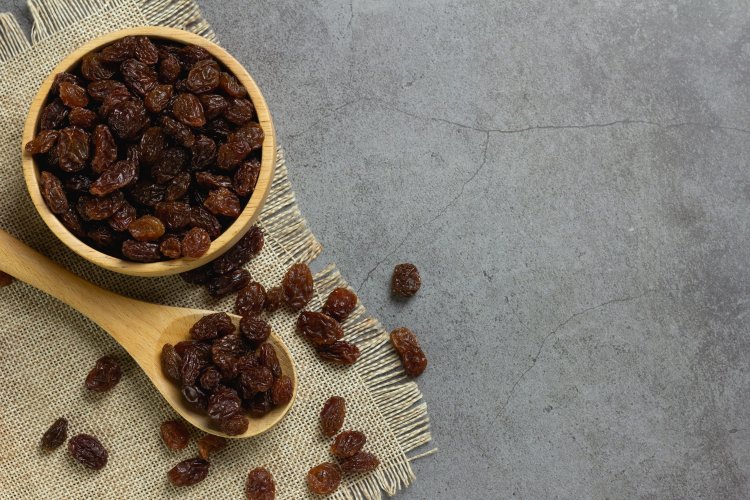Raisins: A Versatile and Nutrient-Rich Snack
Raisins, the dried form of grapes, are not just a snack; they are tiny, nutrient-packed powerhouses enjoyed worldwide for their sweet flavor and versatility. In this comprehensive guide, we will delve into the rich history, nutritional benefits, health impacts, and diverse culinary uses of raisins.

History and Overview:
Raisins have been an integral part of the human diet and culture for thousands of years, with evidence of their consumption dating back to ancient civilizations such as the Egyptians, Greeks, and Romans. The process of making raisins involves drying grapes under the sun or in dehydration facilities, resulting in a concentrated form of the fruit's natural sugars, flavors, and nutrients. This preservation method has allowed raisins to become a staple food in various cultures and cuisines around the globe, appreciated for their long shelf life, portability, and versatility in both sweet and savory dishes.
Nutritional Composition:
Despite their diminutive size, raisins pack a punch when it comes to nutrition. Per 100 grams, raisins typically provide approximately 299 calories, 79 grams of carbohydrates, 3.7 grams of fiber, 3.1 grams of protein, and less than 1 gram of fat. They are also rich in vitamins such as C, K, and several B vitamins, including B6, niacin, and riboflavin. Additionally, raisins boast an impressive array of minerals, including potassium, calcium, iron, magnesium, and phosphorus. This nutritional profile makes raisins a convenient and nutritious snack option, suitable for people of all ages.
Health Benefits:
Incorporating raisins into your diet can have numerous positive effects on health:
Heart Health:
The potassium content in raisins helps regulate blood pressure, while their fiber content supports healthy cholesterol levels, reducing the risk of cardiovascular diseases.
Digestive Health:
Raisins are rich in dietary fiber, which aids digestion, promotes bowel regularity, and supports a healthy gut microbiome.
Antioxidant Properties:
Raisins contain antioxidants like resveratrol, which combat oxidative stress, reduce inflammation, and protect against chronic diseases such as cancer and cardiovascular disorders.
Bone Health:
The calcium, boron, and other minerals in raisins contribute to bone strength and density, reducing the risk of osteoporosis and fractures.
Energy Boost:
With their natural sugars and carbohydrates, raisins provide a quick source of energy, making them an ideal snack for refueling during physical activity.
Culinary Uses:
Raisins are incredibly versatile in the kitchen and can be used in a wide range of dishes:
Baking:
Add raisins to cookies, muffins, bread, and granola bars for natural sweetness, moisture, and texture. They can also be used in cakes, pies, and other baked goods.
Cooking:
Incorporate raisins into savory dishes such as rice pilaf, couscous, tagines, and stuffing to add depth of flavor and a touch of sweetness. They pair well with meats like lamb and poultry.
Salads:
Sprinkle raisins over salads or mix them into dressings to balance out savory flavors with a hint of sweetness. They complement ingredients like leafy greens, nuts, and cheese.
Desserts:
Use raisins in traditional desserts like rice pudding, bread pudding, fruitcake, and oatmeal cookies for a burst of natural sweetness and chewiness. They can also be added to ice cream and yogurt.
Snacking:
Enjoy raisins on their own as a convenient and nutritious snack, or mix them with nuts, seeds, and dried fruits for a homemade trail mix. They are perfect for on-the-go snacking or as a midday pick-me-up.
Conclusion:
Raisins are not only delicious but also incredibly nutritious and versatile. Whether enjoyed as a snack, incorporated into cooking and baking, or used to enhance the flavor and texture of various dishes, raisins offer a wide range of culinary possibilities and health benefits. By including raisins in your diet, you can add a burst of flavor, sweetness, and nutrition to your meals while supporting overall health and well-being.
Disclaimer:
The information provided in this article is for educational purposes only and should not be considered medical advice. If you have any health concerns or are experiencing symptoms, it is important to consult with a healthcare professional, such as a doctor or clinic, for proper diagnosis and treatment. Always seek the advice of your doctor or other qualified health provider with any questions you may have regarding a medical condition. Do not disregard professional medical advice or delay in seeking it because of something you have read in this article.
Hashtags:
#raisins #nutrition #healthbenefits #culinaryuses #healthyfood #snacks #hearthealth #digestivehealth #antioxidants #bonehealth
What's Your Reaction?





















